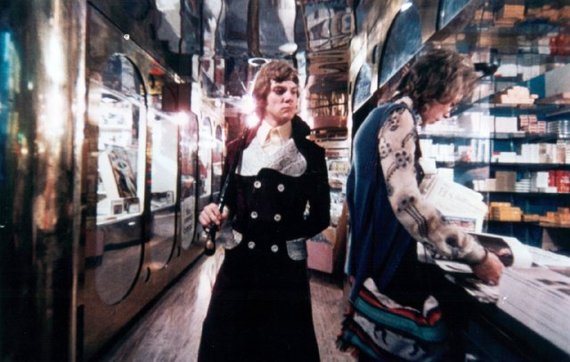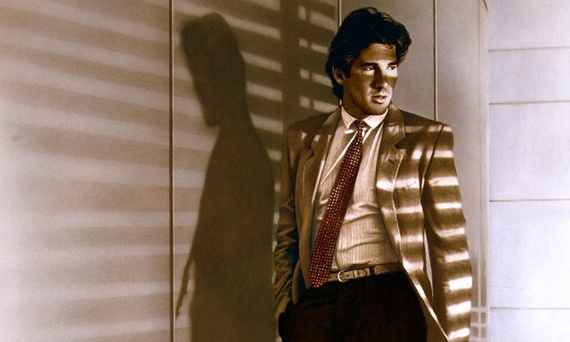By Alex Simon
They say that clothes make the man. They also make the man in the movie and, sometimes, even make the movie itself live on in the annals of classic filmdom. With that in mind, here is a list (in no particular order) of ten gents and the characters they played who changed our sartorial habits forever.
1. Michael Douglas/Gordon Gecko—Wall Street
Arguably the movie that set the style for second half of the 1980s, Oliver Stone’s Wall Street featured Michael Douglas’ Oscar-winning turn as corporate raider Gordon Gecko, whose ruthlessness in the boardroom was only matched by his sense of style. Douglas is all clean lines in his pinstripe suits, suspenders and slicked-back hair, creating an iconic look that screamed “power” and “go fuck yourself” simultaneously.

2. Malcolm McDowell/Alex—A Clockwork Orange
Stanley Kubrick’s dystopian sci-fi allegory is one of cinema’s great dark satires, with a legendary performance by Malcolm McDowell in the lead as Alex, the leader of a futuristic teenage gang who spends his evenings robbing, fighting and raping with his “droogs.” Also one of the most stylish films ever designed, Alex’s “uniform” in all white, with suspenders, jack boots, codpiece, eyeball cufflinks, derby and single false eyelash remains one of the most iconic and repellent outfits in movie history. His Edwardian jacket with snakeskin highlights, featured just before the film’s notorious high-speed orgy sequence, was also a fashion statement that burned itself into the frontal cortex.

3. Steve McQueen/Thomas Crown—The Thomas Crown Affair
The original Thomas Crown Affair, released in 1968, is thought by many enthusiasts to be the most stylish film ever made. Steve McQueen reinvented his blue collar, tough guy image as the Boston Brahmin scion of privilege who masterminds the perfect crime, showing up in a different custom-made outfit in virtually every scene. As if McQueen’s/Crown’s fleets of exotic cars wasn’t enough, his tortoise shell Persol sunglasses with blue lenses made sunglasses a high-end item for the first time in the U.S., gaining the Italian company a firm foothold in the States, which it still enjoys, and sparking a renaissance in 2010, when the company released its “Steve McQueen Collection,” a retro set of specs paying tribute to the man and his unique style.
4. Sean Connery/James Bond—Goldfinger
Sean Connery became THE leading man of the 1960s as superspy James Bond, and though all of his turns as Bond featured one fashion statement after another, Goldfinger remains the signature example. From Bond’s signature Rolex Submariner wristwatch, to his white dinner jacket (and carnation) worn under his wetsuit, to the sky blue terrycloth pool PJs that only someone as cool as Connery could pull off, to the now-iconic gray glen plaid three-piece suit Connery/Bond rocked at Goldfinger’s Kentucky stud farm (and which Leonardo DiCaprio emulated in Steven Spielberg’s Catch Me if You Can), few heroes in movie history can compare with the effortlessly stylish élan of Connery’s 007.
5. Clark Gable/Peter Warne—It Happened One Night
Clark Gable not only looked sharp as a knife edge in Frank Capra’s classic 1934 romantic comedy, he nearly (unintentionally) destroyed an entire industry. While shooting the scene where he undresses, Gable had trouble removing his undershirt while keeping his humorous flow going and took too long. As a result, the undershirt was abandoned altogether. After the film was released and became a runaway hit, it then became cool to not wear an undershirt, which resulted in a large drop in undershirt sales around the country. Legend has it that in response, some underwear manufacturers tried to sue Columbia Pictures.
6. Sidney Poitier/Virgil Tibbs—In the Heat of the Night
Sidney Poitier’s Philadelphia police detective (and fish out of water in rural Mississippi) Virgil Tibbs is the portrait of urbane dignity in every frame of director Norman Jewison’s Oscar-winning film, whether it’s crossing swords with Rod Steiger’s bigoted Sheriff Gillespie, slapping blue-blooded racists in their greenhouses or leveling a length of pipe at some less-than-friendly Klan types. Poitier’s suit is always crisp, his Windsor knotted tie always perfectly centered, his button down shirt has nary a wrinkle. And this is the Deep South in the summertime, sugar! Poitier is, was and always will be THE MAN, with this classic bearing the evidence forthwith.
7. James Dean/Jim Stark—Rebel Without a Cause
James Dean had already perished in a car accident at age 24 by the time Rebel Without a Cause was released in 1955. But Dean’s wardrobe for his character, Jim Stark, literally rewrote teenage fashion forever. Chinos were replaced with Levi’s blue jeans, button down shirts with plain, white t-shirts. And the jacket, that RED cotton windbreaker that seemed to blaze like a warning to any in its path, became so in-demand that manufacturers were back-ordered for nearly a year in some locations. Go into any Abercrombie & Fitch, Lucky Brand or American Apparel store in any mall in America, and you’ll see at least a dozen outfits that are Rebel inspired.
8. Robert Redford/Jay Gatsby—The Great Gatsby
Although director Jack Clayton’s film of F. Scott Fitzgerald’s classic novel left most audiences nonplussed, anyone with an eye for style found it mouthwatering. If the film is notable for anything, it’s for introducing the styles of Ralph Lauren to the world. Lauren, who began manufacturing ties in the Bronx during the mid-60s, was a fan of the classic American fashions that made up the Jazz Age, and his work remains eye-popping, and still-classic, today.

9. Richard Gere/Julian Kaye—American Gigolo
Often viewed as the first truly iconic film of the ‘80s that captured the decadent zeitgeist which the decade came to represent, Gigolo did for Giorgio Armani what Gatsby did for Ralph Lauren. Richard Gere’s male escort had a closet full of Armani, then a relatively unknown Italian designer. In the now-famous sequence when Gere lays out a series of outfits on his bed, trying to decide which is the most seductive, the most fetishistic portrait of male obsession with clothing was committed to film, and new look introduced to the men of the world, one which still endures today.
10. Errol Flynn/Errol Flynn—Any of His Films and in Life
Errol Flynn, during his peak from the mid-1930s through the late ‘40s, cut the most stylish figure in Hollywood. Flynn’s public persona was often far more colorful, interesting and jaw-dropping than the flamboyant, swashbuckling characters he portrayed on screen. In the end, after succumbing at age 50 to decades of over-indulgence, the greatest character Errol Flynn ever played was himself, and his wardrobe choices always belied a skilled eye for what hung well on his towering frame. Whether clad in a tuxedo, a double-breasted suit, or a simple pair of swimming trunks, Errol Flynn made looking good look so damn easy.



















No comments:
Post a Comment